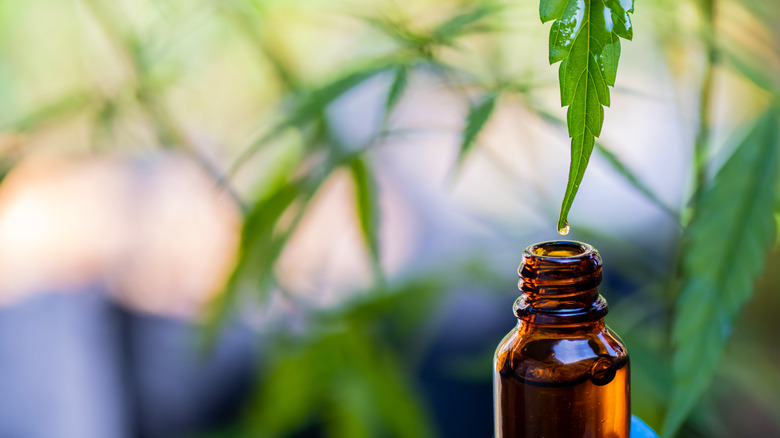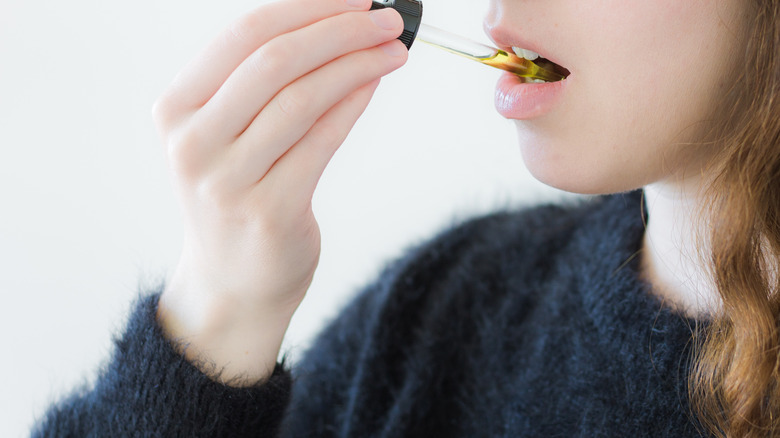Surprising Health Benefits CBD Oil Has For Women
CBD seems to be everywhere we look. Walk into almost any health food store and you'll see a plethora of edible CBD, CBD skincare products, and CBD-laced beverages. It didn't take long for tons of products to flood the market, touting various health benefits of this seemingly magical ingredient. But what exactly is CBD? CBD, or cannabidiol, is a compound extracted directly from the hemp plant, a cousin of the marijuana plant, both considered cannabis plants (via Harvard Health Publishing). While all cannabis plants contain CBD and THC (tetrahydrocannabinol), hemp plants contain more CBD while marijuana plants contain more THC, according to WebMD. Although many of us associate marijuana with getting high, it's actually only the THC compound that causes the psychoactive effects. CBD, on the other hand, has no psychoactive effects. It's important to note that the hemp plant does contain trace amounts, about 0.3%, of THC. While THC levels are relatively low, products like edible tinctures and gummies may still cause euphoric sensations in the body (via Medical News Today). So what's all the hype about CBD and are the health claims legitimate?
Potentially good news for women
There's been a growing interest in clinical data and the potential health benefits of CBD over recent years. However, there are still only a few studies with promising evidence. Such studies suggest CBD may help improve anxiety and act as an anti-inflammatory agent for our skin (via Harvard Health Publishing). For those suffering with acne or other inflammatory skin disorders, CBD may help provide relief. While more research needs to be done, there's plenty of anecdotal evidence suggesting CBD can help with various health issues faced by women, such as insomnia, low sex drive, depression, pain, PMS symptoms, and menopausal hot flashes. Medical experts think CBD is generally considered safe, with relatively little evidence of being dangerous to our health. However, many caution that the FDA does not regulate over-the-counter CBD products in the same way pharmaceutical drugs are regulated, so inconsistencies may exist from brand to brand and even from product to product. This can make it difficult to know how much you're taking, and whether or not it's pure CBD. In fact, Utah made headlines when a group of individuals became sick from counterfeit CBD products sold in a local tobacco store (via JAMA Network). Additionally, it's important to note CBD isn't proven to be safe for pregnant or breastfeeding women.
How to shop for CBD products
In order to gauge a product's safety, Consumer Reports suggests thinking through some important considerations before making a purchase. First, decide what your reasons are for taking CBD. If you need fast relief, you may want a product that will work more quickly in the body. Next, consider the amounts of THC and CBD in the products you're purchasing. You likely don't want a head high if that wasn't the plan to begin with. Then find out where the CBD was grown and ask the manufacturers for test results. Most CBD products sold in the U.S. come from Colorado and Oregon due to their long histories and experience producing cannabis. Knowing more about how your manufacturers source their ingredients can help empower you as a consumer and ensure your safety. It's your right as a consumer to ask for a COA, or certificate of analysis. Those tests should yield the THC and CBD amounts in their products, as well as any potential contaminants. Be careful with CBD sourced from outside of the country, as it isn't subject to any federal or state regulations and testing.


